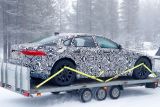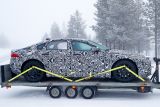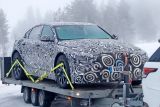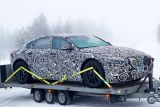A
Auto Express
Guest
The forthcoming all-electric replacement for the Jaguar XJ saloon is drawing closer to production. The all-new model is due to be revealed at the end of 2020, where it will act as a pure electric alternative to Mercedes S-Class – which will soon gain an electric sibling in the form of the upcoming EQS saloon.
Speaking exclusively to Auto Express Jaguar design director, Julian Thomson has revealed the focus behind the new luxury car as development reaches its latter stages. “It’s going to be a very, very luxurious, very, very calm, tranquil piece of transportation,” he says. “But it's not overtly flashy, it's not overtly expensive.
“It’s a car, which you make an emotional connection with. We don't want all our people who get our cars to just sit in the back of them and just be driven around in them. They can be used like that, but at the end of the day, we know that these cars are there to be experienced and driven and enjoyed; enjoyable to sit in, relaxing to sit in, and beautiful to look at.”
The new XJ is also set to be a very different car to Jaguar’s first electric model, the I-Pace. Thomson suggests that the XJ would have a traditional saloon look with the classic long bonnet. “If a cab-forward looking car doesn't suit a certain type of vehicle, I don't think you should do it,” he said. “We're there to make the best looking cars we possibly can, so the new XJ, it does have a bonnet on it, and it's a very, very elegant shape, it's probably a little bit more traditional than the I-PACE.”

Jaguar XJ electric - spied - rear 3/4 static

Jaguar XJ electric - spied - side static

image

Jaguar XJ electric - spied - front 3/4 static

Jaguar XJ electric - spied - front 3/4 static

Jaguar XJ electric - spied - front 3/4 static

image

image

image

Jaguar XJ electric - spied - rear static
This indication from the Jaguar design department would certainly seem to be supported by the latest spy shots of the car in the hands of its development engineers. Our exclusive image reveals how the car could look without its disguise and together with the shots of the test mule, it illustrates the more traditional saloon style that Jaguar is aiming for.
The styling looks to be an evolution of the outgoing car’s looks, retaining the same long and wide stance, narrow headlamps units, as well as the brand’s trademark grille and shark-fin antenna.
Jaguar’s most recent teaser image suggested that the new XJ would receive a sharper XF-inspired rump, with a full-width light-bar. While the rear of the test mule is masked under heavy camouflage, a subtle crease running across the width of the bootlid suggests this feature will appear on the production model.
British built
The new XJ will be made in the UK at JLR's Castle Bromwich production site, safeguarding thousands of jobs over the next few years. It’ll also be the second all-electric model offered by the British brand, following in the footsteps of the award-winning Jaguar I-Pace SUV.
The car will be based on a new platform called MLA, this brand new toolkit for large Jaguars enables battery-electric, plug-in hybrid and mild-hybrid drivetrains to be mounted on the same production line. So far, Jaguar has only discussed the next-generation XJ in an all-electric context, but it's technically possible to produce combustion-assisted versions too.

Jaguar XJ electric - spied - rear 3/4 static

Jaguar XJ electric - spied - side static

image

Jaguar XJ electric - spied - front 3/4 static

Jaguar XJ electric - spied - front 3/4 static

Jaguar XJ electric - spied - front 3/4 static

image

image

image

Jaguar XJ electric - spied - rear static
At last year's Frankfurt Motor Show, JLR boss Sir Ralf Speth said: "Based on our rich knowledge and experience gained from the I-Pace, Formula-E and I-Pace eTROPHY, our engineering team is in full swing to deliver the world’s first, full-electric luxury sports saloon. The flagship of Jaguar: the all-new XJ.
"The new, all-electric XJ – extraordinarily remastered for the 21st century – will offer spiritual freedom for our customers," he said. "Gliding in elegance, new tranquillity and new functionality, and in full consciousness taking care of the environment."
The British manufacturer has pledged to offer electrified options for all its new models from 2020. The new XJ will be the first electric car produced at the brand’s re-tooled Castle Bromwich plant, being designed and developed by the same team responsible for Jaguar’s all-electric premium SUV, the I-Pace.
Jaguar aims to implement “giga-scale” battery production to support the project, with a new UK-based plant in Hams Hall, North Warwickshire. The facility will be operational in 2020 and aims to produce enough batteries to supply 150,000 electric Jaguar Land Rover models each year.
“If battery production goes out of the UK then automotive production will go out of the UK,” Jaguar Land Rover CEO explained. “The battery is 40 per cent of the cost of an electric vehicle - we want to keep this kind of added value inside the UK.”

Jaguar XJ electric - spied - rear 3/4 static

Jaguar XJ electric - spied - side static

image

Jaguar XJ electric - spied - front 3/4 static

Jaguar XJ electric - spied - front 3/4 static

Jaguar XJ electric - spied - front 3/4 static

image

image

image

Jaguar XJ electric - spied - rear static
Basing production of the all-electric XJ at Castle Bromwich also makes logistical sense to Jaguar Land Rover, offering easy access to the firm’s electric motor manufacturing centre in Wolverhampton. The experience of the plant’s current employees (who specialise in working with the XJ’s all-aluminium construction) will also prove invaluable.
Switching the XJ to a pure-electric powertrain will also allow Jaguar to steal yet another march on its German rivals, following the success of the I-Pace. That car arrived around a year before Mercedes or Audi managed to get the EQC and e-Tron to market – cars that are based on existing platforms instead of the Jaguar's bespoke electric architecture.
JLR: major investment
Britain’s biggest car maker has suffered a series of setbacks in recent years, forced to axe jobs and investment to boost profits amid dwindling sales due, in part, to JLR’s reliance on diesel, which has fallen out of favour with consumers.
The facility at Castle Bromwich will be completely overhauled. “I am delighted to announce a major electric vehicle offensive to be built at Castle Bromwich,” Ralf Speth told Auto Express. “This facility will give us the flexibility to develop EVs and hybrid vehicles alongside our diesel cars, giving customers even greater choice.”
Asked about the size of the investment JLR had made at the site Speth added: “If you introduce new architectures it’s not millions but billions - it is spread over a number of years.” The first vehicle to be produced at the site will be the fully-electric, ninth-generation Jaguar XJ.
What are your thoughts on Jaguar Land Rover’s electrification strategy? Let us know in the comments section below…
Continue reading...
Speaking exclusively to Auto Express Jaguar design director, Julian Thomson has revealed the focus behind the new luxury car as development reaches its latter stages. “It’s going to be a very, very luxurious, very, very calm, tranquil piece of transportation,” he says. “But it's not overtly flashy, it's not overtly expensive.
“It’s a car, which you make an emotional connection with. We don't want all our people who get our cars to just sit in the back of them and just be driven around in them. They can be used like that, but at the end of the day, we know that these cars are there to be experienced and driven and enjoyed; enjoyable to sit in, relaxing to sit in, and beautiful to look at.”
The new XJ is also set to be a very different car to Jaguar’s first electric model, the I-Pace. Thomson suggests that the XJ would have a traditional saloon look with the classic long bonnet. “If a cab-forward looking car doesn't suit a certain type of vehicle, I don't think you should do it,” he said. “We're there to make the best looking cars we possibly can, so the new XJ, it does have a bonnet on it, and it's a very, very elegant shape, it's probably a little bit more traditional than the I-PACE.”

Jaguar XJ electric - spied - rear 3/4 static

Jaguar XJ electric - spied - side static

image

Jaguar XJ electric - spied - front 3/4 static

Jaguar XJ electric - spied - front 3/4 static

Jaguar XJ electric - spied - front 3/4 static

image

image

image

Jaguar XJ electric - spied - rear static
This indication from the Jaguar design department would certainly seem to be supported by the latest spy shots of the car in the hands of its development engineers. Our exclusive image reveals how the car could look without its disguise and together with the shots of the test mule, it illustrates the more traditional saloon style that Jaguar is aiming for.
The styling looks to be an evolution of the outgoing car’s looks, retaining the same long and wide stance, narrow headlamps units, as well as the brand’s trademark grille and shark-fin antenna.
Jaguar’s most recent teaser image suggested that the new XJ would receive a sharper XF-inspired rump, with a full-width light-bar. While the rear of the test mule is masked under heavy camouflage, a subtle crease running across the width of the bootlid suggests this feature will appear on the production model.
British built
The new XJ will be made in the UK at JLR's Castle Bromwich production site, safeguarding thousands of jobs over the next few years. It’ll also be the second all-electric model offered by the British brand, following in the footsteps of the award-winning Jaguar I-Pace SUV.
The car will be based on a new platform called MLA, this brand new toolkit for large Jaguars enables battery-electric, plug-in hybrid and mild-hybrid drivetrains to be mounted on the same production line. So far, Jaguar has only discussed the next-generation XJ in an all-electric context, but it's technically possible to produce combustion-assisted versions too.

Jaguar XJ electric - spied - rear 3/4 static

Jaguar XJ electric - spied - side static

image

Jaguar XJ electric - spied - front 3/4 static

Jaguar XJ electric - spied - front 3/4 static

Jaguar XJ electric - spied - front 3/4 static

image

image

image

Jaguar XJ electric - spied - rear static
At last year's Frankfurt Motor Show, JLR boss Sir Ralf Speth said: "Based on our rich knowledge and experience gained from the I-Pace, Formula-E and I-Pace eTROPHY, our engineering team is in full swing to deliver the world’s first, full-electric luxury sports saloon. The flagship of Jaguar: the all-new XJ.
"The new, all-electric XJ – extraordinarily remastered for the 21st century – will offer spiritual freedom for our customers," he said. "Gliding in elegance, new tranquillity and new functionality, and in full consciousness taking care of the environment."
The British manufacturer has pledged to offer electrified options for all its new models from 2020. The new XJ will be the first electric car produced at the brand’s re-tooled Castle Bromwich plant, being designed and developed by the same team responsible for Jaguar’s all-electric premium SUV, the I-Pace.
Jaguar aims to implement “giga-scale” battery production to support the project, with a new UK-based plant in Hams Hall, North Warwickshire. The facility will be operational in 2020 and aims to produce enough batteries to supply 150,000 electric Jaguar Land Rover models each year.
“If battery production goes out of the UK then automotive production will go out of the UK,” Jaguar Land Rover CEO explained. “The battery is 40 per cent of the cost of an electric vehicle - we want to keep this kind of added value inside the UK.”

Jaguar XJ electric - spied - rear 3/4 static

Jaguar XJ electric - spied - side static

image

Jaguar XJ electric - spied - front 3/4 static

Jaguar XJ electric - spied - front 3/4 static

Jaguar XJ electric - spied - front 3/4 static

image

image

image

Jaguar XJ electric - spied - rear static
Basing production of the all-electric XJ at Castle Bromwich also makes logistical sense to Jaguar Land Rover, offering easy access to the firm’s electric motor manufacturing centre in Wolverhampton. The experience of the plant’s current employees (who specialise in working with the XJ’s all-aluminium construction) will also prove invaluable.
Switching the XJ to a pure-electric powertrain will also allow Jaguar to steal yet another march on its German rivals, following the success of the I-Pace. That car arrived around a year before Mercedes or Audi managed to get the EQC and e-Tron to market – cars that are based on existing platforms instead of the Jaguar's bespoke electric architecture.
JLR: major investment
Britain’s biggest car maker has suffered a series of setbacks in recent years, forced to axe jobs and investment to boost profits amid dwindling sales due, in part, to JLR’s reliance on diesel, which has fallen out of favour with consumers.
The facility at Castle Bromwich will be completely overhauled. “I am delighted to announce a major electric vehicle offensive to be built at Castle Bromwich,” Ralf Speth told Auto Express. “This facility will give us the flexibility to develop EVs and hybrid vehicles alongside our diesel cars, giving customers even greater choice.”
Asked about the size of the investment JLR had made at the site Speth added: “If you introduce new architectures it’s not millions but billions - it is spread over a number of years.” The first vehicle to be produced at the site will be the fully-electric, ninth-generation Jaguar XJ.
What are your thoughts on Jaguar Land Rover’s electrification strategy? Let us know in the comments section below…
Continue reading...
